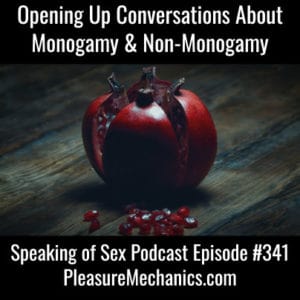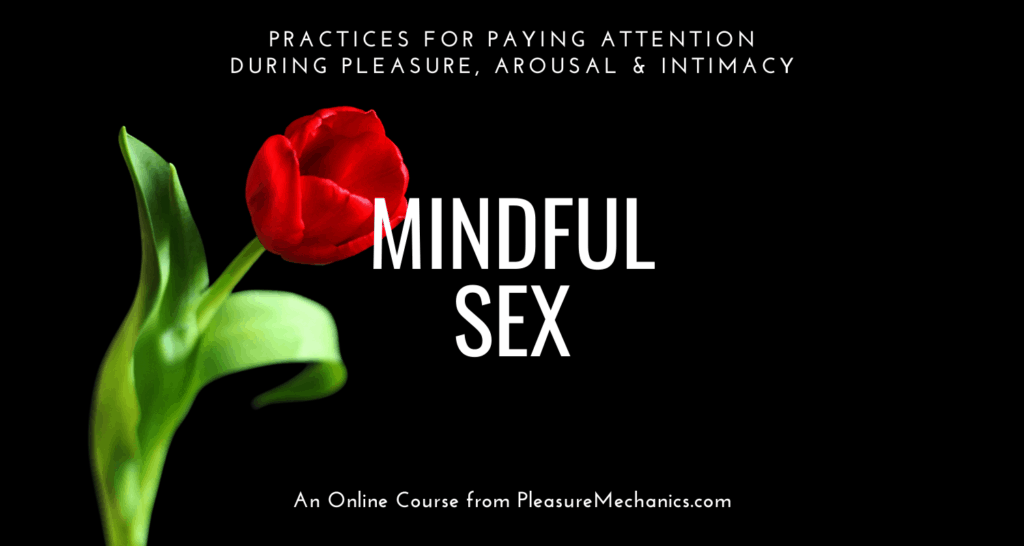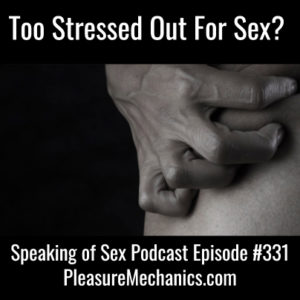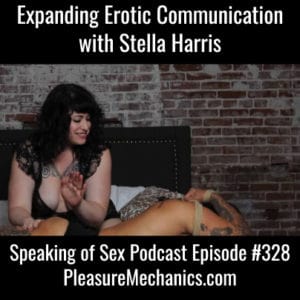Podcast: Play in new window | Download

Context is perhaps the most important factor in how you experience your sexuality. Context is all of the factors in the external environment AND in your internal landscape that create the story of each moment. Human sexuality is incredibly context dependent – meaning even small changes in the context of an erotic encounter can create huge differences in how that moment is perceived, felt and experienced.
Understanding the impact of context on your erotic experience will help you manage the factors you can control and learn to work with those you can not to cultivate more optimal grounds for the erotic experiences you yearn for. Meanwhile, we can all work towards creating a healthier global context for all bodies to experience more erotic freedom.
Thanks to Emily Nagoski’s teaching about erotic context in her landmark book Come As You Are.
Speaking of Sex Podcast Episodes Mentioned
- Episode #227: Manage Your Turn Ons and Turn Offs
- Episode 332: Create Your Bedroom Haven
- Episode 338: Sexual Attitude Adjustments
Love the podcast? Ready for more?
Join The Pleasure Pod & Get The Interactive Worksheet & More of the Best of Pleasure Mechanics!
Transcript for Speaking of Sex Podcast Episode #372
Chris Rose (00:00):
Welcome to Speaking of Sex with the Pleasure Mechanics. I’m Chris.
Charlotte Rose (00:05):
I’m Charlotte.
Chris Rose (00:06):
We are the Pleasure Mechanics. And on this podcast, we have honest, vulnerable, explicit conversations about love, bodies, relationships, pleasure, all of the facets that combine to create the human experience of sexuality. It’s a good thing we have 370 episodes and counting because this stuff is complicated. Come on over to pleasuremechanics.com where you will find our complete podcast archive, and to get started with us right away, go to pleasuremechanics.com/free where you can enroll in our free online course and check out our other resources we have waiting and ready for you. We have been doing online sex education for 13 years.
Chris Rose (00:54):
The beauty of that, somehow I’m kind of just waking up to is that we have so much to offer you because we’ve been working on these resources and building them and building out these courses that are now just ready and waiting for you. We have courses on everything from couples massage, where you get to see Charlotte pleasure the human body head to toe. We have courses on foreplay where you get all of our erotic massage techniques, and then our newer courses like kink and erotic spanking and mindful sex. So, we are ready to guide you. It’s like we drop into your home through the beauty of the internet and are there with you stroke by stroke.
Chris Rose (01:37):
When you have questions, you can jump on and ask us. We are there for you in this kind of beautiful way, and it allows us to have over 10,000 students in our school now. It’s a school of 10,000 global pleasure seekers all there to learn how to love and share more pleasure and give the ones in their life that they love the most more joy. It’s a really beautiful community. I don’t know. Why am I talking about this? You’re invited. Come on over to pleasuremechanics.com where you find everything we have to offer. It’s just a real joy being in this work, especially now. So, to timestamp this episode a little bit, it’s May 2020. We are again in the midst of the global coronavirus pandemic, and it is really more important to me than ever to be here for you all and share techniques to come home to our bodies and to one another, if you have access to touch, but also just to be here in this conversation about how we can love one another better and resource one another in our bodies and share the love because we all need it right now.
Chris Rose (02:54):
All right, deep breaths. We are going into today’s episode. We were looking again for another episode that we could talk to about one of these tools that will be always relevant for you, always here for you to help you understand your sexuality and your sexual experience a little better, but also helps us understand this moment we’re in. This crisis, emergency moment of social change and fallout, and perhaps even revolution. We are in it. We are in it with you, and we’re going to be talking about sexual context.
Chris Rose (03:32):
Context is a word we use a lot, and it’s come up a lot for me recently in the emails from you as you’re describing the sudden changes in your sexual responses. Like I used to really love cunnilingus, and now I feel nothing but tickly and anxious. What’s going on? Why did my body change so suddenly? Or my husband and I were in this great rhythm of sex and all of a sudden I have zero interest. Should I divorce him? We’re all experiencing these tremendous changes.
Chris Rose (04:01):
What I want to remind us all to do is slow down and remember and honor how context dependent human sexuality is, how context dependent human sexuality is. So, human sexuality meaning our sexual responses, how our bodies respond to touch, our desires and our wants that someone called libido, what we’re up for, what we’re craving that, but also our orientation, who we’re attracted to, but also our identity, who we feel ourselves to be. All of these facets of human sexuality from our identity to our sensation responses and our arousability and our orgasmic response, that entire spectrum changes dependent on your context.
Chris Rose (04:55):
Okay. What is context? That’s the big question.
Charlotte Rose (05:00):
When we say context, we mean all of the external circumstances that impact and affect us, and the state of our mind and our brain in the present moment.
Chris Rose (05:12):
So, it’s like the entire story of the present moment.
Charlotte Rose (05:16):
Exactly.
Chris Rose (05:17):
Right?
Charlotte Rose (05:17):
Everything outside, everything inside our bodies. It is enormous. It is a huge experience.
Chris Rose (05:24):
But, we start breaking that down. Right? So, everything from the temperature of the room to what is visually in the room to the sense in the room and the memories of those sense.
Charlotte Rose (05:35):
If you’re feeling safe, if something is new and novel.
Chris Rose (05:39):
What kind of day you had at work, what kind of week you had, month you’ve had, year you’ve had. Right? So, the temporal context. We can just keep going, right? If you’re building a scene and it’s almost … I have what I call like a white box fantasy, right? So, if we think of … You know that scene in The Matrix where you have a white box and you just drop a human being in it? Everything we need to know about that moment is context. Where are they? Who are they with? What kind of day in life have they had? And then the social context, right? Then we get relational and we start looking at the relational context of a sexual moment. Then we start looking at the context of your emotional state and your body state. Whew. This is a lot of details to attend to, and we can see if we start factoring all of that in and we start grouping it under this word context, we see why human sexuality is context dependent. So, if it is so big, how is this useful?
Charlotte Rose (06:45):
Without the understanding that context affects literally everything, we think that there’s something wrong with us when our libido tanks, when we have no desire, when things that normally have felt good, don’t feel that good anymore and we think there’s something wrong with us. So, it’s so important to understand that something that has changed in the context could be deeply affecting your experience of your own body and pleasure.
Chris Rose (07:12):
Context is one of those factors that’s so important to be reminded of again and again. When you feel a change, when you’re confused, when you’re feeling a longing like looking around and feeling your context can really help us understand our current expression as an individual sexual creature amongst this sexual culture we are living in. Emily Nagoski writes a lot about this in her landmark book Come As You Are, which is her offering, looking at tons of science of sexuality. When we say science, everything from biology to social sciences to neuro-psychology. Nagoski gathered all of that up under her wise arms and then wrote this book, Come As You Are, that offers us so many really important frameworks to understand sexuality, so we reference it a lot, but she talks a lot about context.
Chris Rose (08:08):
One of the way she teaches about this is to think about tickling. Tickling is another one of those sensory inputs that often has a social context, and we can understand right away how the experience of being tickled is completely context dependent on whether that is delightful and perhaps even arousing or annoying or perhaps even violent and intrusive. Right? All of that experience of being tickled at the same part of your arm with the same pressure, your experience of that tickle is context.
Charlotte Rose (08:48):
This is perception, how we experience the sensation is different depending on the context. We physically experience the same sensation as different in different contexts.
Chris Rose (09:03):
So, I want to think like context beyond, right? Because we can look around our own homes and think context. We did a episode that actually got way more response than we were planning on it getting about remaking your bedroom and creating a sexier context in your bedroom. Getting rid of the things that cause you stress. Again, Emily Nagoski reminds us of that gas breaks model. So, in thinking about context, you can think of what are the things that put gas on my arousal and what are the things that put the brakes on my arousal or even my willingness or wanting this.
Chris Rose (09:38):
Again, the tickling, you’re doing dishes and thinking about what a shitty day you’ve had and the water is splashed on you and your belly is wet and you already feel gross and you can’t wait to get in the shower and your lover comes up and tickles you, you might snap into a fight versus you’ve had a great day and you’ve been walking around. You’re feeling totally relaxed and you’re having a drink together. A butterfly goes by and you’re both just in it. Your lover reaches over and tickles you like a butterfly. You might think that’s like the most romantic, delightful thing ever. The context there is not only that sensual atmosphere, it’s also the emotional atmosphere. This is a word we use a lot when we say safety.
Chris Rose (10:22):
When I say safety, I’m talking about social safety, the state in the body. I can’t wait to geek out on the neuroscience of this with you all some time, but the state in the body that tells us we are socially safe, we belong. We can relax and just be, that is a very specific state of the human nervous system. It allows pleasure. It allows connection. It’s what makes that tickle feel delightful instead of intrusive. I really invite you all to explore this context of safety, because you can feel unsafe with your own spouse, in your own home. Your body state is one of threat and hypervigilance and not safety. If that is your context, almost nothing can get through that or you discover that’s your context and you start working with it and you start doing some trauma recovery and you start working with your nervous system and you start learning what works for you. For a lot of those people, you can find entry points.
Chris Rose (11:30):
If you’re a hypervigilant anxious person and your nervous system is always cranked up, you need to know that about yourself to create a context where you’re going to want to have sex. That needs to be done on purpose. Versus if your nervous system is one of hypoarousal, hypo meaning low, again, needs to be dealt with if you want the context of building arousal and sharing arousal. We all need to know our bodies and what context they come with preloaded. That’s a lot based on your personal history, your social history, your sexual history, and this context, this inner story, the story of your nervous system, how you respond to stimuli, how you feel safe and socially connected and when you don’t. Frankly, some of us have never felt socially safe and connected while having sex. Our culture doesn’t set us up for that.
Chris Rose (12:30):
Our cultural context and, again, I could go in for this for hours. Our cultural context is not one that facilitates, how do I say this in the gentlest way possible, our cultural context is one of sexual violence and it does not facilitate feeling safe in our erotic bodies and feeling safe getting naked with one another and vulnerable and being ready to share sexual pleasure. It just doesn’t. So, we need to create that context on purpose. This inner context, the state of your nervous system and how you respond to things is the work of a lifetime. We can focus on that context of our home, our bedroom, but frankly, it’s all too easy to redecorate the bedroom when you haven’t worked on the inner landscape of your mind and your body.
Chris Rose (13:24):
One more thing and then I’m going to throw it back over to Char, but I want to also get out the context really tells us a lot about triggers. This is a word we will do a whole episode about some time, but triggers are you can think of them as fireworks preloaded with context. Those fireworks in our bodies are preloaded with stories and trauma that has been stuck and things we have not resolved. It explains why one person being pushed up against a brick wall in an alley being kissed that will be the hottest thing ever. For another person that could be a trigger that sends them into a panic response, a trauma response. Triggers also … and the positive side of triggers, so triggers are the things that set off a fear or a trauma response in the body. What we call glimmers are the things that set off a pleasure response, a safety response.
Chris Rose (14:24):
So, we can start kind of mapping our triggers. What are the things that make you feel totally turned off right away? They’re like the emergency brake being pulled on your arousal, on your interest in sex. We all have them. Some of them are preloaded from trauma. Some of them are like, “Oh, that reminds me of my …” Whatever makes that like that … the repulsion, those are breaks in your context. Then the gas, the glimmers are the things that make you feel like you want to be erotic, that you want to feel sexual. What are the things in your environment and the mindsets and attitudes that can help you build a context for more eroticism within the context of the moment that you maybe can’t control. We’re all experiencing a big context that we have more or less control about. Then there’s context you can control and start shaping. Thank you for letting me get that all out.
Charlotte Rose (15:28):
Why this is so important to understand is because as humans, if we don’t have this larger understanding of the significance and impact of context, we will immediately make our lack of desire or lack of interest in sex our own fault. We will think that we are broken. There is something wrong with us, and that is perhaps why we’re not as interested in sex right now when we are at this moment of global stress.
Chris Rose (15:58):
But, that is all just within our one being and then we think about the context and the relationality of a moment, and that is another realm of control we can start attending to. This is where intention comes in, but we also have to recognize that intention isn’t the same as what Charlotte was saying as perception. So, we can start attending to the context where we’re trying to initiate sex, for example, where we’re trying to connect with our lover. Is this a good context for what I’m trying to experience together or does the context need some shaping before the experience I am seeking, right? This is the response that comes out of me when I get emails, like I really want to spank my wife, but we have never even talked about sex. It’s like you don’t get to jump to step 15 without starting to get comfortable talking about sex, right? We need to start where we are and start shaping the context towards the experiences we are longing for.
Charlotte Rose (17:06):
So, there’s so much unlearning and unpacking and unraveling of the things we’ve been taught from our family, from our culture that we’ve integrated, that influences all of our actions and behaviors. Then there’s the rebuilding and re-imagining different ways of being. This is an enormous job. It can feel overwhelming to think about how much context influences and impacts our lived experience of sexuality, but it’s important to remember that it can go both ways. While it can make for a challenging experience of our sexuality, it can also be something that is cultivated and can create more of the sexuality that we want to be experiencing.
Chris Rose (17:58):
Context is bisexual. It goes both ways. It goes all ways, right? It can be supportive. It can be draining. When you look at context again in these circles of what can you control and what do you not control, you start realizing there’s gas and brakes all around us. Some of those levers are inaccessible to us and others are right at our fingertips. We will link in the show notes page to the manage your turn ons and turn offs, where we talk about this gas and breaks model. It is essential if you haven’t listened to it yet, but do not despair because context can be cultivated to support you.
Charlotte Rose (18:37):
What that means is that you can take small actions that you can control to influence an impact for the better, your own experience of your body, your relationships with others, your circle of influence with your community, where you can be creating more context that is sexually supportive. So, we can take actions. There is so much we can’t control, but there is a lot we can control to try and create an experience of a more joyful sexuality-
Chris Rose (19:12):
Or at least take steps towards creating that social safety, to start opening up to relaxing into pleasure. That might be where you’re at. I use a lot of woodworking metaphors. Shout out to all the home hobbyists and send me pictures of your woodworking, but here’s a gardening metaphor for you. When we talk about cultivating the context, for all the gardeners out there, we understand soil remediation. We’ve all inherited a polluted plot of land with paltry soil where not much can grow very well and to the extent you have access to more or less sunlight, better or worse soil, more or less minerals is a lot about your cultural context within the systems of power in our culture, and that needs to be remediated, but when we’re looking at the conditions around the plant that is you, right? Your vine, your flower, will you bloom if you don’t work on the soil on the context?
Chris Rose (20:14):
Hells no, you’re going to wither, right? You’re going to struggle and all life wants to grow. We’ve been spending time in the garden. It’s beautiful how persistent life is, how much it wants to grow, how much it reaches towards the light, how much it wants to fricking bloom and be pollinated and [rah 00:20:30] We are like those flowers. We want to thrive. We are looking all the time for the conditions to do so. The little acts, it’s listening to this podcast, it’s having conversations with less shame, it’s giving yourself permission to buy that toy at last, it’s reading the books, doing the inner work to remediate the soil of your sexual context. Sometimes that means taking things out. Sometimes that means putting things in, right?
Chris Rose (21:01):
So, we root out, we excavate that which does not serve. The body shame, the attitudes about pleasure, the voices that are telling you, what right do you have to this? How dare you? Who do you think you are? All of that bullshit needs to come out of your context. What needs to go in is a lot of permission, a lot of gratitude, a lot of sense of, “Oh, pleasure is actually good for me. When I do this, I feel good. My relationship feels better. I can choose the pleasures and kinds of connections I want, so I don’t have to do the things I don’t want to do.” Right? We have to instill new attitudes, and that’s what we’re doing here.
Chris Rose (21:40):
Week by week on this podcast, we are here with you. We are here with you as we do this work of changing the context so we can have more sexual joy, pleasure, and connection. I keep coming back to these three words, by the way. Joy, pleasure, connection has these kinds of big whys behind sex, right? It’s about the fucking, but it’s also about so much more. Yeah, we’re in it with you and we hope these resources help you create a context for yourself that supports you more while we also all work to create a global context to support this one organism of human sexuality that thrums around the earth. Right? All right.
Charlotte Rose (22:30):
So, please be kind to yourself as you explore your context. Most of it is ideas and beliefs that you did not choose that has been handed down to you. A work that you do to pull it out will influence you, the people around you and the next generation truly, truly. So, it is incredibly powerful work. It matters. It affects your lived experience of your own life and it’s powerful and valuable. So-
Chris Rose (23:01):
Just starting with the big attitudes feels overwhelming. Start with the small stuff. We did this whole episode on creating a bedroom haven. Start with the small stuff, give yourself permission to clear off your bedside table and only bring back things that support your erotic context. What needs to be there, what doesn’t need to be there, what is wanting to be there, right? If you could slide open your bedroom drawer and reach in and there was an object that supported your sexual pleasure, what would that object be? Is it massage oil? Is it lube? Is it a sex toy? Is it a book of erotica? Is it a sleeping mask so you can get better sleep?
Chris Rose (23:45):
What one thing could you tuck in the drawer that would support your erotic context tonight? What is one thing you can remove immediately? That pillow that you got when you were a kid that for some reason you’ve been holding onto, but every time you see it, it makes you feel like a child. Put it in the attic, give it away. What is one thing that’s a little drain or a break? Start with the small stuff and start noticing. As we shift our contexts, and this has to be deeper than kind of [inaudible 00:24:25] our sex life, right? This isn’t about just objects. That is one place to start, but it has to be about our interior lives and, again, our nervous system. The context of how you respond to touch, to flirtation, to initiation, to social connection at all, is so much a story that lives in our nervous systems and we need to remember that too can change. Positive neuroplasticity tells us and guides us and shows us how to start changing the context of our nervous systems. That to me, feels like magic.
Chris Rose (25:05):
We have so much more to share around this. We will be back with you with further episodes of the Speaking Of Sex podcast. Please remember, you can always take a deeper dive with us at pleasuremechanics.com where you will find not only our complete podcast archive, but also our suite of online courses, where you can learn new erotic skills, go deeper with us and get our personal support. You will find it all at pleasuremechanics.com. Join us. We love you. We are here for you, and if you love the show and want to support our work, pleasuremechanics.com/love. Send us the love, show your support, and we will be back with you with another episode of the Speaking Of Sex podcast. I’m Chris.
Charlotte Rose (25:52):
I’m Charlotte.
Chris Rose (25:53):
We are the Pleasure Mechanics.
Charlotte Rose (25:54):
Wishing you a lifetime of pleasure.






